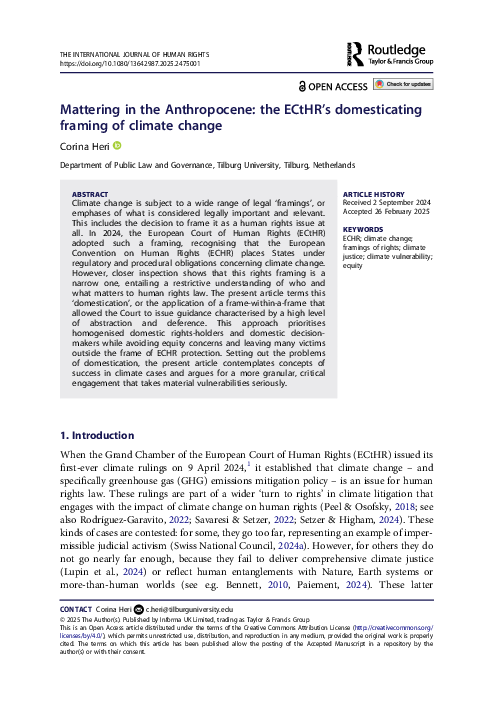Mattering in the Anthropocene: the ECtHR's domesticating framing of climate change

The International Journal of Human Rights
2025
Early View
1–23
European Court of Human Rights ; climate change ; social justice ; just transition
Law
https://doi.org/10.1080/13642987.2025.2475001
English
Bibliogr.
"Climate change is subject to a wide range of legal ‘framings', or emphases of what is considered legally important and relevant. This includes the decision to frame it as a human rights issue at all. In 2024, the European Court of Human Rights (ECtHR) adopted such a framing, recognising that the European Convention on Human Rights (ECHR) places States under regulatory and procedural obligations concerning climate change. However, closer inspection shows that this rights framing is a narrow one, entailing a restrictive understanding of who and what matters to human rights law. The present article terms this ‘domestication', or the application of a frame-within-a-frame that allowed the Court to issue guidance characterised by a high level of abstraction and deference. This approach prioritises homogenised domestic rights-holders and domestic decision-makers while avoiding equity concerns and leaving many victims outside the frame of ECHR protection. Setting out the problems of domestication, the present article contemplates concepts of success in climate cases and argues for a more granular, critical engagement that takes material vulnerabilities seriously."
This work is licensed under the terms of the Creative Commons Attribution 4.0 International License (http://creativecommons.org/licenses/by/4.0/).
Digital
The ETUI is co-funded by the European Union. Views and opinions expressed are however those of the author(s) only and do not necessarily reflect those of the European Union or the ETUI.